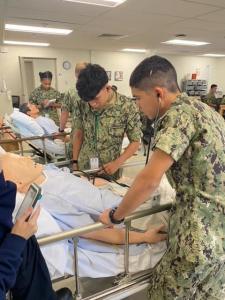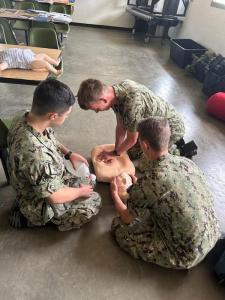
Sea Cadets Explore Medical Career Paths in Hands-On Training Programs
Teens Experience Real-World Medical Scenarios and Career Insights Through Sea Cadets Training Programs
ARLINGTON, VA, UNITED STATES, September 24, 2024 /EINPresswire.com/ -- From helping wounded comrades in a simulated combat scenario to treating patients in a mock hospital setting, Sea Cadets built their first aid skills in hands-on training camps around the country this summer.
Medical professions — both military and civilian — are among the many career paths teens can explore through weeklong training programs in the U.S. Naval Sea Cadet Corps.
The youth program has been offering medical training for years, and it is among the most popular offerings for cadets looking to gain valuable experience and insights in professions they may be interested in pursuing.
One recent training, held July 20-28 at Camp Joseph T. Robinson in Little Rock, Arkansas, covered advanced tactical medical. About a dozen cadets expanded their medical knowledge in the classroom and then applied it in a fast-paced combat scenario. Taking on the role of medics attached to a Marine unit, the cadets helped clear rooms in a shoot house, applied tourniquets on wounded comrades, and carried them out.
“These are real applications of what (military medics) may have to deal with, but we do it in a safe, controlled environment,” said Sea Cadet Lt. j.g. Carey Monaghan, a civilian volunteer who serves as commanding officer of the Harry S. Truman Squadron of Sea Cadets out of Kansas City, Missouri.
Along with the training at Camp Robinson, Monaghan led an advanced tactical medical program at the Crisis City complex outside of Salina, Kansas, July 5-14. Crisis City offers a range of lifelike emergency settings, such as a collapsed building and a derailed train. In the latter scenario, cadets boarded the train, treated injured passengers and evacuated them on stretchers.
The hands-on training gives youths a chance to try out medical fields they’re interested in before committing to them, according to Monaghan.
“Some want to be doctors; some want to be paramedics or EMTs, either civilian or military,” she said. “In this advanced training, they can see if it fits what they thought it was going to be like.”
In Maryland, 22 cadets from around the country spent a week of their summer learning about the vital work of emergency medical technicians, or EMTs, and earning first aid and CPR certifications. The program, which took place July 28-Aug. 3 at Hood College in Frederick, put the cadets in a mock hospital classroom, where they applied their training to treat mannequin patients — some of which “talked” via an instructor in an adjacent room. Participants also toured a local hospital’s emergency room and met professional EMTs.
The training offers an up-close look at what it’s like to work as an EMT and in a hospital, which gives cadets valuable insights as they chart their future career paths, according to Sea Cadet Lt. j.g. Shannon Fleischer, a civilian volunteer who serves as commanding officer of the Seaman Craig Bryan Wibberley unit of Sea Cadets in Frederick.
“It definitely helps them figure out if they want to go into the medical profession,” said Fleischer, who coordinates Sea Cadets training at Hood College. “They can narrow down their search and figure out where they want to go after high school.”
Cadet Petty Officer Ryan Lin, a cadet who attended the training at Hood College this summer, said he has always been interested in the medical field and wanted to learn more about career paths while building vital knowledge and skills, such as CPR.
“These skills that I have learned are very important and beneficial because if emergencies ever happen, I can be there to help make a difference,” Lin said.
Another summer program, held July 28-Aug. 3 at Naval Air Station Pensacola in Florida, trained cadets on the medical aspects of the flight environment. The training was based on the Navy’s aerospace medical technician and flight medic courses, and cadets received more than 40 hours of instruction from active-duty instructors. They also delved into aviation physiology and
water survival training.
Sea Cadets’ diverse training offerings enable young people to immerse themselves for a week in an area of interest — from aviation to culinary arts to underwater robotics — so they can determine whether they really want to pursue it.
“You can explore the options for a reasonable price and see if you like it, and you’re not locked into anything — you can change your mind,” Monaghan said. “If you decide medical is not for you, then you can go to diving or master-at-arms training or something else next year.”
About Sea Cadets
The U.S. Naval Sea Cadet Corps (Sea Cadets) is the Navy’s youth leadership program for middle and high school students. Sea Cadets gives young Americans a competitive edge by providing world-class leadership development and a wide array of exciting training opportunities. Sea Cadets learn teamwork in a disciplined environment, wear military uniforms, and develop patriotism. Sea Cadets gain self-confidence and grow into productive citizens ready for life’s many challenges. For more information, go to www.seacadets.org.
Brittany DiPippo, Public Affairs Officer
U.S. Naval Sea Cadets
email us here
Visit us on social media:
Facebook
LinkedIn
Instagram
YouTube
Distribution channels: Education, Emergency Services, Healthcare & Pharmaceuticals Industry, Military Industry
Legal Disclaimer:
EIN Presswire provides this news content "as is" without warranty of any kind. We do not accept any responsibility or liability for the accuracy, content, images, videos, licenses, completeness, legality, or reliability of the information contained in this article. If you have any complaints or copyright issues related to this article, kindly contact the author above.
Submit your press release

